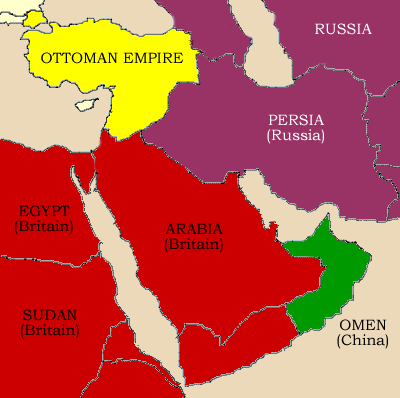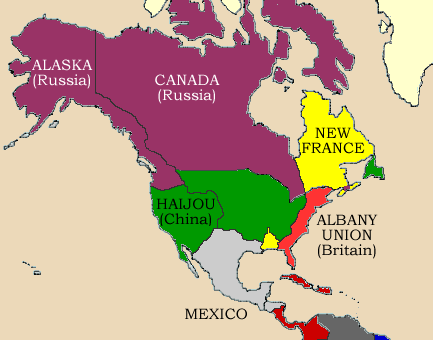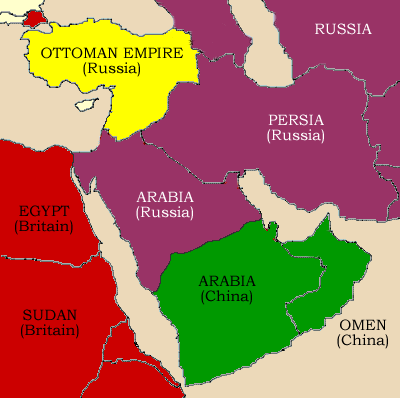PREMISE - GEOGRAPHY & POLITICS - MAJOR EVENTS - FORUMS & JOIN
1905-1920: The Second Ottoman War (World War II)
Russia sees the possibility of the British Empire cornering the world oil market, and as this would significantly affect them, moves to secure its needs and maintain what it sees as its rightful place and influence in the Middle East. Their attempted seizure of the Middle Eastern oil fields quickly leads to war being declared between Russia and Britain. This quickly spills over from the Middle East and spreads to the rest of the world. China, also seeing the problems of a British oil monopoly, joins the war on Russia's side, forcing Britain out of the Philippines. The NEU originally attempted to remain neutral in the conflict, but sees a possibility to retake Finland from the Russians.

Following five years of war, virtually no progress was made in the Russian conquest of the Near East. Persia expanded somewhat into Ottoman territory, but Britain was able to retake Persian territories in the south, expanding their Arabian colony. Russia, preferring stable oil supplies (and already holding large oil resources on the Russian mainland) coordinated a surprise attack on the North American continent with its Chinese allies, invading the continent from their western colonies of Alaska and Haijou.
The alliance of China, Russia and Nouvelle France proved
superior to the British alliance's forces on the North American continent.
British reinforcement from North Africa were attacked by Russian submarines
while underway to the American continent. British submarines escorting the fleet,
however, were able to hold off much of the attackers, though one British vessel
was sunked, an other heavily damaged, forcing the crew to abandon ship.
Upon arriving at the Albany Union strongholds of New York, Philadelphia and
Baltimore, combined British and Union forces took position in the fortresses
along the Albany Union borders. Although outnumbered, they were able to hold off
the invader attacking from the west, resulting in heavy losses for both parties.
Due to the weakened defense in the north, Nouvelle France was able to conquer
most northern British territories.
With Mexicon support from the south, Florida was preventing from falling into
enemy hands. Upon conquering the Mississipi Delta, the Chinese/Russian alliance
launched a massive invasion of the Louisiana/Mississipi provinces, regaining the
territory for Nouvelle France. The Mexicon army was forced to withdraw, but was
able to withstand a total invasion of their dominion.

Upon British withdrawel from the Middle East region, the
Chinese/Russian alliance saw its chance to conquer most of the British their
colonial possessions there. With Chinese support from their southern Omen colony,
the Russian infantery launched an invasion of Arabia from their Persian colony.
A long, hard battle follows for the city of Mecca, which degenerates into
house-to-house fighting. The Russians manage to repel the British, but in the
process the most holy sites in Islam are destroyed.
The Chinese/Russian alliance also occupied the Britain-sympathizing Ottoman
Empire, installing a Russian-friendly government in Constantinople. The British
fleet stationed in the Bosporus prevented European Ottoman territory from
falling into Russian hands, making it a British stronghold.
Furthermore, the Chinese/Russian alliance attempted to invade the northern
African territory, through an invasion of British Egypt. The British army,
slightly outnumbered, but supported by superior airforces, was able to fight off
the invaders at the Suez Channel, immediately ordering the construction of
numerous stronghold fortresses at their side of the channel, preventing total
enemy control over this strategic location.

Leaving Russian defenses in north Africa weakened, the British, with NEU support from their neighbouring Algeria colony, quickly invaded the Russian western Sahara colony. The NEU also re-occupied Finland, resulting in the Chinese/Russian invasion of its Congo colony. A diplomatic agreement between the powers was settled: no further NEU involvement in the war would leave the NEU in control of Finland and the former Russian western Sahara (which it would later trade with Britain for their southern most African colony); The Congo, Bolivia and western-Suriname would fall in Chinese/Russian hands.